Exercise 1
A. Josh and Samia are discussing the next staff meeting. Before you listen, match the words and phrases (1–6) with the correct definitions (a–f).
1 action point
2 agenda item
3 AOB (Any Other Business)
4 deadline
5 minutes
6 matters arising
a a written record of what people say during a meeting
b the time when something must be finished by
c something that will be discussed during the meeting
d the time when you can ask questions about the previous meeting
e a task for someone to do after the meeting
f things that need to be discussed but are not included on the agenda
B. Listen to Josh and Samia discussing the meeting and complete the agenda (a–f). How do you think they feel about the meeting?
Staff Meeting
8 December (15.00–16.30) Room 2. Chair: Don A.
| DRAFT AGENDA | ||
| Item | Responsible | Time |
| 1 Matters arising | 15.00–15.10 | |
| 2 Staff reports | All | 15.10–15.25 |
| 3 (a)……………… | Mike | 15:25–15.35 |
| 4 (b)……………… | (c)……………… | 15.25–15.45 |
| 5 Micro-kitchen | Deirdre | 15.45–16.00 |
| 6 (d)……………… | (e)……………… | 16.00–16.15 |
| 7 AOB | 16.15–16.30 | |
| 8 (f)……………… | 16.30 | |
Answer & Audioscript
A
1 e 2 c 3 f 4 b 5 a 6 d
B
a financial report b (results of) market survey
c Josh d office party e Samia f close
They are not very interested in the meeting. Samia says that item 6 is the only item she is interested in. Josh says he is looking forward to Close, which is the end of the meeting.
Audioscript
J = Josh S = Samia
J: Hey, it’s Josh, how are you?
S: Fine, thanks, Josh. How are you?
J: Good, thanks. Listen, did you get the agenda for this afternoon?
S: Yes. You didn’t get it?
J: No.
S: I’ll send it to you. And the minutes from the last meeting. Got them?
J: Thanks. Oh, no, Don’s chairing again; that means it’ll go on and on.
S: Yes, probably. So you’re going to present the results of your market survey?
J: Which item is that? Oh, yes, four. It’s quite interesting actually.
S: Really? And did you prepare anything for Item 3?
J: The financial report? No, that was an action point from the last meeting for Mike. Anyway, what’s Item 5 all about? Micro-kitchen? What’s that?
S: Dierdre wants to set up an office kitchen. I think it’s quite a good idea.
J: I see you’re organising the office party again this year, Samia!
S: Yes, that’s me, Item 6 – it’s the only item I’m interested in.
J: No surprises. What are you planning?
S: Ah, you’ll have to wait and see.
J: Item 8 – Close – that’s my favourite item … Do you think we’ll leave on time, though, with Don in the chair?
Exercise 2
A. Listen to part of the meeting and decide if the sentences are true (T) or false (F). In pairs, correct the incorrect sentences.
1 Everyone is on time for the meeting except Josh.
2 Harry has just joined the team.
3 Harry agrees to manage the timing of the meeting.
4 Ellen doesn’t want to take the minutes.
5 The team discussed the micro-kitchen idea during the last staff meeting.
6 The budget for the micro-kitchen is more than 500 pounds a month.
B. Listen again and complete the expressions.
1 Right, so let’s ………………. .
2 Does anyone want to add anything ……………….?
3 Harry, ………………. you to be time-keeper?
4 And could I have a volunteer to ……………….?
5 So, ………………. to item 5: this is Deirdre’s point, I think.
6 The reason ………………. discuss this ………………. agree on a budget.
Answer & Audioscript
A
1 F – Samia is late. 2 T 3 T
4 F – She agrees. 5 T
6 F – 500 pounds is suggested for the maximum budget.
B
1 start 2 to the agenda 3 can I ask 4 take the minutes
5 moving on 6 I want to, / is to
Audioscript
Don = Don J = Josh E = Ellen S = Samia H = Harry De = Deirdre
Don: Everyone ready?
J: Samia will be a little late. She’s on another call.
Don: OK, but I’d like to start on time; it’s a full agenda today. Can you tell her what we said, Josh?
J: Sure.
Don: Right, so let’s start. Nice to see everyone and welcome back to Ellen.
E: Thanks, it’s lovely to see everyone.
Don: So, one reason for meeting is to introduce you all to Harry. He started on Monday and he’ll be helping us with our nances.
All: Hello, Harry. / How are you doing? / Nice to meet you.
Don: Does everyone have a copy of the agenda? Does anyone …
S: Hi, everyone. Sorry I’m late.
Don: Samia, hello. Take a seat. The main aim today is to catch up before the holidays. Does anyone want to add anything to the agenda?
All: Not really. / No. / I’m ne.
Don: We have AOB if anything comes up. Harry, can I ask you to be time-keeper?
H: OK.
Don: And could I have a volunteer to take the minutes? Josh, Ellen?
E: OK, sure. I can do that.
Don: Thanks for agreeing. I know it’s a busy time. So, let’s look at Item 1, Matters Arising from the last …
E: Sorry, can we just go back to Item 2? What was the decision? I didn’t quite understand it …
Don: So, moving on to Item 5: this is Deirdre’s point, I think. Harry, how are we doing for time?
H: We’re on time for the moment.
Don: Great. Deirdre, over to you.
De: Thanks. I’d like to talk about the micro-kitchen we agreed on at the last meeting.
J: Did we?
De: Ah, yes.
S: … And you even agreed to help set it up.
J: Did I? Oh, OK, sorry.
De: Right. The reason I want to discuss this is to agree on a budget. I found some possible suppliers, but of course we need to get some quotes.
H: What did you include in the budget?
De: It seems contractors for micro-kitchens supply everything. I think a maximum of 500 pounds a month is reasonable. What do you all think?
Exercise 3
A. Listen to Ewa presenting three possible locations for the new office in Berlin. Put her slides in the correct order.
SLIDE A OFFICE LOCATIONS
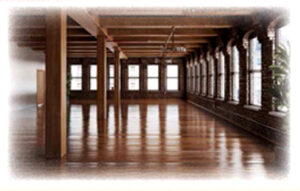
SLIDE B OFFICE LOCATIONS: KREUZBERG
• Co-working space in an old (1)…………… in the south of the city.
• (2)…………… m2 in total with workstations for (3)…………… people and meeting rooms.
• Includes high-speed internet, use of (4)……………, shared kitchen.
• Rent €(5)…………… per workstation/month. No deposit required. Min. rent period (6)…………… . One-month cancellation.
SLIDE C OFFICE LOCATIONS
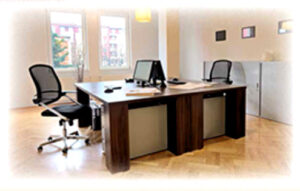
SLIDE D OFFICE LOCATIONS: MITTE
• Office room in modern building in the (1)…………… of Berlin.
• (2)…………… m2 large room and (3)…………… m2 small office for meetings.
• Includes furniture, high-speed internet, (4)…………… service, shared kitchen.
• Rent €(5)…………… /month plus onemonth deposit. Min. rent period (6)…………… . One-month cancellation.
SLIDE E OFFICE LOCATIONS
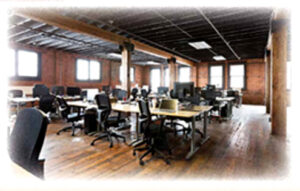
SLIDE F OFFICE LOCATIONS: PRENZLAUER BERG
• Has no (1)…………… . Office in old building in (2)…………… Berlin.
• (3)…………… m2 including two (4)…………… .
• Includes kitchen, two toilets.
• Rent €(5)…………… /month plus (6)…………… deposit. Min. rent period six months. Three-month cancellation.
B. Listen again and complete Ewa’s presentation slides. Use one to two words in each gap.
Answer & Audioscript
A
1 A 2 F 3 E 4 B 5 C 6 D
B
Prenzlauer Berg:
1 furniture 2 northeast 3 120 4 meeting rooms 5 2,600 6 7,800
Kreuzberg:
1 factory (building) 2 400 3 40 4 printer 5 300 6 two months
Mitte:
1 heart (centre, middle) 2 25 3 15 4 cleaning
5 1,800 (two rooms) 6 three months
Audioscript
E = Ewa M = Mark
Extract 1
E: Now, I’ve done an online search and spoken to some estate agents and I’ve made a selection of three places we can see on our trip to Berlin this week.
M: OK! Great! Good work!
E: So, take a look at the photo of this first office. It’s empty at the moment so you have to imagine it with furniture. We’d need to buy office desks, chairs, and everything.
M: Yes, those old wooden floors, doors and window frames look lovely. Where is it?
E: It’s in Prenzlauer Berg. It’s a fashionable neighbourhood in northeast Berlin. It’s in a beautiful old building and various creative and media start-ups are already using the building.
M: How big is it?
E: The space is 120 square metres, and that includes two meeting rooms, a kitchen and two toilets. Oh, and the agent says there’s a nice park in front of the building; we could sit and relax in the lunch break. And lots of cafés, bars and restaurants are within walking distance.
M: What about transport links?
E: The location is close to public transport. Actually it’s never really a problem in Berlin. All these offices I’m showing you are well connected and easy to reach from the main train station and airports.
M: Sounds good. And the rent?
E: That’s 2,600 euros a month. There’s a deposit to pay of 7,800 – that’s three months’ rent. Then there’s a six-month minimum period to rent the place, with a three-month cancellation period.
M: Um! It’s quite expensive. Maybe we don’t need so much space. We could probably find something somewhere in the UK for that price …
Extract 2
E: Well, wait a minute … I’ve looked at properties in other parts of Berlin, too – what do you think of this one?
M: I love it. Nice big windows, the office looks very bright in the photo. And this one has furniture!
E: The place is a co-working space in an old factory building in Kreuzberg. That’s a trendy neighbourhood in the south of the city.
M: How big is it?
E: In total it’s 400 square metres on two floors. Freelancers pay to rent workstations and there’s space for around 40 people. Lots of independent creative workers are based there.
M: Workstations?
E: It means desks. And there is a room we can book for free for private conferences and meetings. We also get high-speed internet, use of the printer and also a shared kitchen with free coffee and water.
M: And it would be easy to talk to people we might want to work with.
E: That’s right!
M: What can you tell me about the neighbourhood?
E: Very multicultural with exciting arts events. Lots of graffiti on the walls and bohemian cafés, that sort of thing.
M: Sounds like a nice place to live, too. I could walk or cycle to work every day. And the rent?
E: It costs just 300 euros per workstation, per month.
J: So, as there are four of us, we could have a shared work space for just 1,200 euros a month, and we could rent more workstations as the team grows.
E: Yes, it’s an option with lots of choices. There’s no deposit to pay, a two-month minimum period to rent a workstation and just one month cancellation.
Extract 3
E: So … That brings me to the third option. Here’s the photo. It’s an ‘office room’. Basically, that means a company is offering a separate room on the tenth floor of their company offices. It’s in the heart of the city, the Mitte district – that means ‘in the middle’ and it’s where all the main tourist sights are – the Brandenburg Gate, the Potsdamer Platz and lots of big companies.
M: Sounds like a prestigious location for the company address.
E: Yes! This one is in a big modern office building with lifts and views over Alexanderplatz. The office room is 25 square metres, so it’s probably big enough for five or six people.
M: But there isn’t a separate meeting room?
E: No, but I thought of that. They also have a 15-square-metre office room for rent on the same floor, so we could rent two rooms and use one as a meeting room. The rent includes furniture, internet, cleaning service and use of the company’s shared kitchen and bathrooms.
M: So, how much is the rent?
E: For the big office room it’s 1,200 euros a month and there’s a 1,200-euro deposit to pay. There’s a three-month minimum period only to rent the place and just one month cancellation.
M: So, the same price as the co-working office. And if we rent the two rooms?
E: That’s another six hundred a month. So, for two rooms we’re talking about 1,800 a month rent and 1,800 deposit.
M: Could we just rent the small office and the four of us work in there for a few months instead?
E: No way Mark! Don’t be crazy!
C. Listen to Ewa and Mark discussing the three offices after their visit. Complete the notes.
MITTE OFFICE
Pros ……………………………
Cons ……………………………
PRENZLAVER BERG OFFICE
Pros ……………………………
Cons ……………………………
KREUZBERG OFFICE
Pros ……………………………
Cons ……………………………
Answer & Audioscript
Mitte office
Pros: location/address, love the idea of working in the city centre
Cons: nothing in common with finance company, expensive flat rents in the area
Prenzlauer Berg
Pros: great old building, room to grow, save money in future
Cons: expensive, darker than expected, three flights of stairs and no lift
Kreuzberg office
Pros: lots of fun people, terrace, cheapest option
Cons: get distracted from work, no privacy, difficult to book the meeting room
Audioscript
E = Ewa M = Mark
E: OK, so let’s make a list of the pros and cons of each office and see if we have a clear winner.
M: OK, I’ll start with the Mitte office. It’s in a great location, prestigious address but the company there is in nance, so we have nothing in common with them. It’d be better to be in a place with other new creative companies I think.
E: True! Being around other start-ups makes more sense for us. I wouldn’t rent a flat in that area either. It’s too expensive. Though that’s not a major problem because the public transport network is so good. I love the idea of working in the city centre.
M: What about the Prenzlauer Berg office? Great old building! It would certainly give us room to grow. Having a big office would be expensive now, but we could save money in the future if we didn’t have to move again soon.
E: True! I liked the office, but it was a bit darker than I expected. That concerns me. I like a bright space to work in.
M: I guess we could buy some bright lights. There’s no lift though and it’s three flights of stairs up – not all our clients might like that.
E: And the co-working space in Kreuzberg? There were certainly a lot of fun people there and I loved the terrace. Great to have some outside space.
M: Yes, but I wonder how much work we’d get done. It would be easy to get distracted and spend all day chatting in that office!
E: And I’m worried about the lack of privacy. I mean, our projects are confidential. I don’t think clients would feel happy about us being in a co-working space. And trying to book that one meeting room when we need it could be di‑ cult.
M: Still, it is the cheapest option, and we’d make friends quickly in Berlin. We should decide soon. Rents are rising fast in the city. But do you really think Berlin is the place for us? I’m still not sure about this move abroad and I’m not sure what Paul, Yelena and the rest of the team are going to say about it ….
E: I’m sure they’ll love the idea! Berlin is really multicultural. It has a real buzz about it.
M: I’m not sure. I think I’d miss London, you know. Oh … time to go or we’ll miss our flight.
Exercise 4
A. Listen to a radio programme and choose the correct option.
1 The radio programme is mainly about
a cooking.
b restaurants.
c property.
2 Steve Harris helps people find the right place
a for their businesses.
b to live.
c to have a meal.
3 Steve says that in an area with low football, there are
a many people.
b few people.
c many amenities.
4 According to the interviewer, an area with high football has
a no other restaurants.
b lots of parking.
c lots of people walking there.
5 Steve explains that an expensive restaurant will do well in a part of town
a with cheap restaurants.
b with no other restaurants.
c with some expensive restaurants.
6 Another important consideration when choosing a location is
a transport links.
b traffic.
c size.
B. Listen again and decide if the statements are true (T) or false (F).
1 Steve Harris helps restaurant owners find city locations.
2 Most restaurants are still open after their first year.
3 It’s easy to open a successful restaurant.
4 It’s difficult to find the right area for your restaurant.
5 It’s a good idea to choose an area with lots of competition.
6 You need to consider the amount of parking available.
Answer & Audioscript
A
1 b 2 a 3 b 4 c 5 c 6 a
B
1 T
2 F – ‘We know that over fifty percent of new restaurants fail in their first year.’
3 F – ‘It’s a very difficult business to get right.’
4 T
5 F – ‘Too many similar restaurants in the area means too much competition and it might be difficult to get enough people to come to your restaurant.’
6 T
Audioscript
I = Interviewer S = Steve Harris
I: Today on Where to Eat I’m talking to Steve Harris, business location expert. Steve will help you find the right location for your business, especially if you want to open a restaurant. He is the expert in finding the perfect location for the restaurant or café you want to open in the city. Hello, Steve, and welcome.
S: Thank you very much. It’s great to be here.
I: So, Steve, let’s get straight to the point. We know that over fifty percent of new restaurants fail in their first year. That’s a terrible statistic, isn’t it?
S: It is. It’s a very difficult business to get right.
I: But why do so many fail?
S: Well, one very important reason is location.
I: I thought you were going to say that …
S: Yes … but the truth is that if the location for your restaurant is wrong to begin with, it’s almost impossible to make the business a success.
I: So what is the wrong location?
S: The obvious one is a part of town with low footfall.
I: Low footfall? What does that mean?
S: Footfall means the number of people going past your business, so a high footfall means lots of people will walk past your restaurant, and a low footfall means there aren’t many people passing by.
I: So if your restaurant is on the High Street, next to lots of really popular shops, near the shopping mall and other amenities, you’ll get a high footfall and lots of people will come and eat at your restaurant.
S: Well, yes, possibly, but the location also has to be the right one for the kind of restaurant you’re planning to open.
I: OK, yes …
S: What I mean is, if you open a really expensive restaurant in a part of town with mid-range or low-priced shops, there might be a high footfall, but you’re not getting the right sort of customers for your business.
I: Yes, I see. So if the other restaurants in the area are fish and chip shops or fast food burger places, then your expensive restaurant won’t be successful because people won’t come to that part of town to spend a lot of money on an expensive meal.
S: That’s right. It’s got to be the right location for the type of food, the price and the customers.
I: There’s a lot to think about. So if you find an area with lots of expensive restaurants, then that’s the location for your expensive restaurant?
S: Not exactly. That’s where it gets complicated. Too many similar restaurants in the area means too much competition and it might be difficult to get enough people to come to your restaurant.
I: I see. So there has to be a balance: not too many, not too few, but enough restaurants of a similar price range.
S: Yes, but there is more to think about than the competition from other restaurants. You need to look at transport links and parking. People won’t drive if there aren’t enough parking spaces. And you can’t be too far from the bus stop or underground station. If people have to walk a long way, then they won’t come. And then, of course, there is rent. If the rent is too high, it becomes impossible to make a profit …
Test
1. You will hear eight short recordings twice. For questions 1–8 choose the correct answer.
1 What isn’t part of the job benefits?
a private healthcare
b a pension plan
c reduced price gym membership
2 What is the problem with the location of the man’s new desk?
a It´s too hot.
b It’s too noisy.
c It’s too light.
3 Where does the woman work?
a
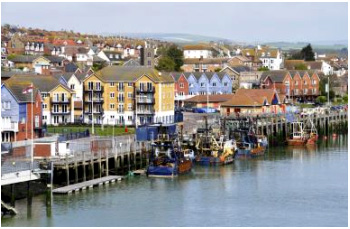
b

c
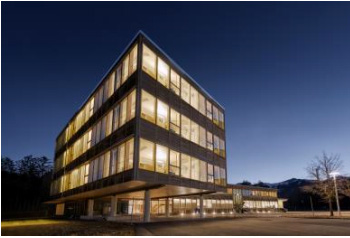
4 What do they not have time to talk about in the meeting?
a staff pay
b staff training
c the annual conference
5 Where does the woman want to hold the conference?
a The Grand Hotel
b The Meridian Hotel
c The Palace Hotel
6 Who is going to take the meeting minutes?
a Shreeya
b Leon
c David
7 What time is Ms Lee’s appointment?
a 8.30 a.m.
b 4.15 p.m.
c 1.00 p.m.
8 What is near the new office?
a a hotel
b a bank
c an airport
Answer & Audioscript
1 a 2 a 3 a 4 b 5 c 6 b 7 a 8 c
Audioscript
1 What isn’t part of the job benefits?
A: I think that’s all from us. Do you have any questions about the job?
B: Yes, I’d just like to ask if there are any benefits like private healthcare that come with the job.
A: We don’t have that, but there is a pension scheme and we have a gym on site.
2 What is the problem with the location of the man’s new desk?
I don’t think I did very well in the office move. I wanted more space and I got that, but I’m right next to the window and the heat is terrible because the sun comes in all day. It’s nice and light and it isn’t next to the lift, which can be noisy, but I’m not very happy really.
3 Where does the woman work?
A: Did I tell you about my new job?
B: No, are you still in the city?
A: No, I’ve moved. I really like the new place. It’s in a small town and it’s very close to the sea. It’s quiet and it’s only thirty minutes’ drive from my home in the countryside.
B: That sounds lovely!
4 What do they not have time to talk about in the meeting?
OK, I think we are going to have to go straight to AOB. We don’t have enough time to talk about all of the agenda. We’ve covered the big issue of staff pay, and we can talk about the conference now, but I think we need to put staff training on next week’s agenda.
5 Where does the woman want to hold the conference?
A: So where do you want to hold the annual conference this year?
B: Well, not the Grand Hotel where it was last year. It was much too noisy.
A: What about the Meridian Hotel then?
B: That’s a good idea, but it’s quite expensive, so I’d prefer the Palace Hotel. It’s more central.
6 Who is going to take the meeting minutes?
A: OK, so before we get started, we need someone to take the meeting minutes because David is away. Shreeya, can you do it?
B: I can’t I’m afraid, I’ve got to leave in the middle of the meeting.
A: OK then, Leon, you can take them and send them around after the meeting.
7 What time is Ms Lee’s appointment?
A: Hello, is that Central Bank? I’d like to make an appointment with Mr Gomez.
B: Of course, who is it for?
A: Ms Lee from Citycorp. She wants an appointment tomorrow if possible. Is there anything around one o’clock?
B: Nothing for then I’m afraid. He is available when the bank opens at eight thirty or mid-afternoon, a quarter past four.
A: The early morning is good. Can I book that?
8 What is near the new office?
So, we’ve looked at all the options for the new office. We thought we should move it near the hotel in town because it’s good for visitors, but it’s too expensive there. We decided to locate it near the airport, and it’s great for international clients. It’s further from our banking head office, but there is plenty of good transport.
Related Posts
- Practice Listening Business English Exercises for A2 – Personal development and training
- Practice Listening Business English Exercises for A2 – Managing time
- Practice Listening Business English Exercises for A2 – Future trends
- Practice Listening Business English Exercises for A2 – Performance
- Practice Listening Business English Exercises for A2 – Corporate hospitality
- Practice Listening Business English Exercises for A2 – Environmental protection
